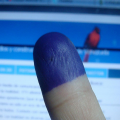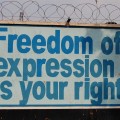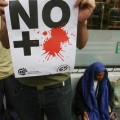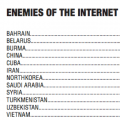Stories about Free Expression from April, 2013
Cameroon: Blogger Enoh Meyomesse Still in Jail
Cameroonian writer and blogger Enoh Meyomesse has been in jail for over 17 months. Accused of stealing and illegally selling gold, he was sentenced to seven years imprisonment after a process that several organizations considered illegitimate. Free expression advocates believe that authorities wish to silence Meyomesse, who has written extensively about human rights violations and inequality in the country.
AFTE Releases Legal Guide to Digital Security for Arab Human Rights Activists
The Association for Freedom of Thought and Expression, in Egypt, issued a “legal guide to digital security” as part of its digital freedoms programme. The guide was produced for campaigners and human rights activists and lawyers interested in freedom of digital expression and the confidentiality of communications and information stored on mobile phones, computers or any other device used to store or distribute data or information
Will the Revolution Still be Tweeted? Venezuela's Netizens Face Uncertain Future
Since the death of Hugo Chavez and narrow victory of Nicolas Maduro in Venezuela, two social media users have been arrested for posting information deemed “destabilizing” to the country. On election day, the Internet was briefly shut down throughout most of the country. And today, social network users are facing threats to their employment status, as authorities search profiles for signs of political affiliation that have, in several cases, resulted in users losing their jobs.
Peru: The Cyber Crime Bill is Back
The Cyber Crimes Bill or #LeyBeingolea, was on the Congress agenda last week but was never addressed. The controversial Denial Bill was also there, which would penalize those who "approved, justify, deny or minimize crimes committed by members of terrorist organizations."
Human Rights Verdict Could Affect Cisco in China
In 2011, two separate lawsuits were filed against Cisco Systems alleging that its technology enabled the government of China to monitor, capture, and kill Chinese citizens for their views and beliefs. To what extent are these human rights violations attributable to technology provided by Cisco?
Hong Kong Citizen Media Site Faces DDoS Attack From China
Hong Kong-based citizen media platform inmediahk.net was hit by a DDoS attack last week, coming mainly from China. Inmedia, a volunteer citizen media network, has been blocked in mainland China since 2007. Inmedia members believe that recent coverage of controversial issues, including a dock workers' strike in Hong Kong and the construction of a military pier in the city's center, may have triggered the attack.
#FreeRod: Preliminary Victory in Chilean Twitter Parody Case
A court in Chile has dismissed claims against Chilean Twitter user Rodrigo Ferrari, who was facing prosecution for operating a Twitter account that parodied millionaire Andrónico Luksic. The decision is not final and may be reviewed by the Court of Appeals, but it is a good sign for the future of online free expression in Chile.
Mexico: Another Voice Goes Silent [UPDATE]
A social media user known only as Valor Por Tamaulipas recently announced plans to close Facebook and Twitter accounts that have become popular sources of information on drug violence in northern Mexico. Valor por Tamaulipas (Courage for Tamaulipas) has been using social media to crowdsource reports from citizens in the state of Tamaulipas, which has been riddled with drug-related conflict and corruption since 2006.
Venezuela: Facebook User Detained for “Destabilizing” Photograph
Two days after presidential elections in Venezuela, authorities detained Andrés Rondón Sayago, a citizen who allegedly spread photographs of burning ballots. Officials say that the photographs were taken during 2007 elections, not in the present day. Rondón Sayago has been accused of sharing the photographs with “destabilizing intentions.”
Russia's #1 Netizen Heads to Trial
Pussy Riot, eat your heart out. On April 17, Russia’s most polarizing blogger, Alexey Navalny, will stand trial for embezzling roughly half a million dollars from a state-owned timber company in the city of Kirov. In a country constantly plagued by politicized legal proceedings, prosecuting the nation’s most prominent netizen promises fireworks.
Wikipedia's Suicide Mission Against Russian Censors
Smoking cannabis is dangerous business for people the world over. In Russia, just writing about it online can get you in trouble. State officials informed Wikimedia Russia that the government has placed its “Cannabis Smoking” article on its blacklist of illegal websites.
Chadian Blogger Detained
Internet Without Borders reports that Jean Laokolé, a Chadian blogger and writer, was arrested on March 22 by security forces in N'Djamena, Chad's capital. In a petition released today, the advocacy group calls for the blogger's "immediate and unconditional release." Laokolé writes under a pseudonym for one of Chad's most popular blogs, where he covers corruption and other problems in politics.
Bangladesh: Global Voices Condemns Assault on Bloggers
The Global Voices community, comprised of bloggers, writers, and activists from more than 100 countries, wish to express our concern about the current state of freedom of expression online in Bangladesh. We call for the immediate release of detained bloggers and urge government actors to uphold their commitments to national law and international human rights doctrine.
Kuwaiti Twitter User Jailed for Insulting Emir
Insult the Emir on Twitter and go to jail: Hamid Al Khalidi has been sentenced to two years in prison for insulting the Emir of Kuwait on Twitter. His attorneys plan to appeal his case to a higher court next week.
Accused of Blasphemy, Three Bloggers Detained in Bangladesh
The Detective Branch of Bangladesh Police has detained three bloggers- Rasel Parvez, Mashiur Rahman Biplob & Subrata Adhikari Shuvo yesterday night for their alleged write-ups demeaning Islam and Prophet Muhammad. Since yesterday the community blogging platform Amarblog.com has become inaccessible from Bangladesh. It is yet to be known whether the authorities have blocked it and why.
Saudi Netizens Criticize New Internet Monitoring Scheme
Saudi government plans to impose surveillance measures on encrypted online communications, such as Skype, WhatsApp, and Viber have triggered sharp criticism from Saudi Internet users. If the companies behind these programs refuse to comply with the measure, authorities say they will be blocked.
Bangladesh Authorities Go After Bloggers, Claim They Are ‘Anti-Muslim’
As deadly clashes between Islamist activists and authorities continue to escalate religious tensions in Bangladesh, the country's telecommunications authority is making moves to silence bloggers deemed anti-Muslim or anti-state. Award-winning blogger Asif Mohiuddin has become the latest target.
Saudi Arabia Threatens to Block Skype and WhatsApp
Saudi Arabia is threatening to block a number of popular communication tools, such as Skype and mobile messaging service WhatsApp, unless the operating companies agree to infringe on the privacy of users and monitor them.


















